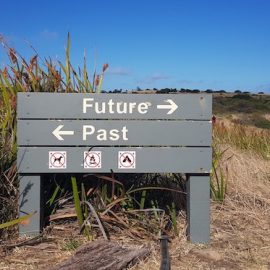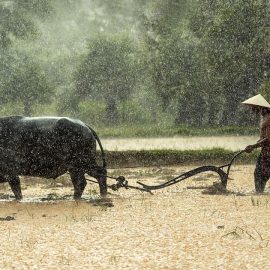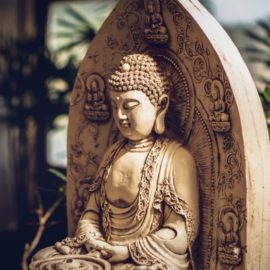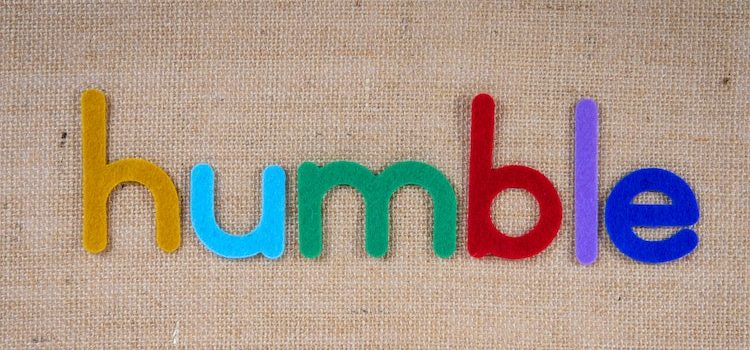
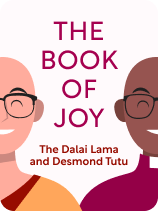
This article is an excerpt from the Shortform book guide to "The Book of Joy" by The Dalai Lama, Desmond Tutu, and Douglas Abrams. Shortform has the world's best summaries and analyses of books you should be reading.
Like this article? Sign up for a free trial here.
What’s the importance of humility? What kind of life will you live if you’re arrogant?
Humility is one of the Eight Pillars of Joy that Desmond Tutu and the Dalai Lama describe in their book The Book of Joy. The opposite of arrogance, humility has the power to put you in someone else’s shoes and build powerful bonds.
Discover why humility is important in the grand scheme of things.
The Power of Humility
Desmond Tutu and the Dalai Lama explain the importance of humility in great detail. They believe that having a well-rounded perspective on your place in the vastness of the world naturally leads to humility. Humility is the understanding that we’re all flawed, and therefore no one is better or more important than anyone else.
(Shortform note: If you want to become more humble, Neil Degrasse Tyson suggests starting with the study of astrophysics. In Astrophysics for People in a Hurry, he argues that the vastness of the universe reminds you that people, and especially you, aren’t the center of the universe. In the grand scheme of things, human differences are trivial compared to what we have in common as a species.)
Humility allows you to understand your limited capacity to control the world or address the totality of its problems. Knowing you can’t address these challenges alone will naturally lead you to work more with others and, in doing so, you’ll gain a greater appreciation for our interdependence.
| Shifting the Paradigm: Independence to Interdependence In First Things First, Stephen Covey argues that our society tends to overvalue independence, always attributing success (or failure) to the individual. While he acknowledges that independence is important, our hyperfocus on independence comes with a cost. An independence paradigm focuses on individual production, which often causes people to neglect their personal needs or devalue time spent helping others or building relationships. The paradigm of interdependence, on the other hand, states that individuals can’t live independently from one another. We necessarily rely on each other to live, work, and thrive. Covey suggests that shifting your orientation from independence to interdependence will provide you with greater life satisfaction in the knowledge that you’re contributing to the collective good. |
Unlike humility, arrogance, or the belief that we’re better or more special than others, leads to loneliness. If you can’t acknowledge your flaws, or your capacity for both productive and destructive behavior, then you won’t be able to form authentic connections with other people. This lack of vulnerability and self-awareness will keep people at a distance. Moreover, if you don’t understand the important role other people play in your life, you can’t appreciate humanity’s interdependence.
(Shortform note: In A New Earth, Eckhart Tolle contends that humanity’s arrogance not only leads to loneliness but has also caused immeasurable harm to our species and the planet. He argues that we’re controlled by our egos, which drives us to seek fulfillment through ownership and feeling superior to others. This in turn drives consumerism, war, and environmental degradation. He argues that only by cultivating mindfulness, and becoming aware of the destructive tendencies of our ego-driven behavior, can we save humankind and the planet.)
Tutu and the Dalai Lama clarify that just because you’re not special doesn’t mean that you aren’t important. Every person has gifts to bring to the world. When you’re humble, you can celebrate and share your gifts, while also honoring the gifts that other people bring.
(Shortform note: Jen Sincero, author of You Are a Badass, claims that everyone is born with a unique and valuable gift. Figuring out what that gift is will give your life purpose and meaning. She offers a few tips to help figure out what this “true calling” is, including trying something new to learn more about yourself and observing what the people around you are doing to notice what excites you.)

———End of Preview———
Like what you just read? Read the rest of the world's best book summary and analysis of The Dalai Lama, Desmond Tutu, and Douglas Abrams's "The Book of Joy" at Shortform.
Here's what you'll find in our full The Book of Joy summary:
- Archbishop Desmond Tutu and His Holiness the Dalai Lama's guide to joy
- What joy actually is and why it matters so much
- How to find joy exactly where you are, no matter what your life looks like


